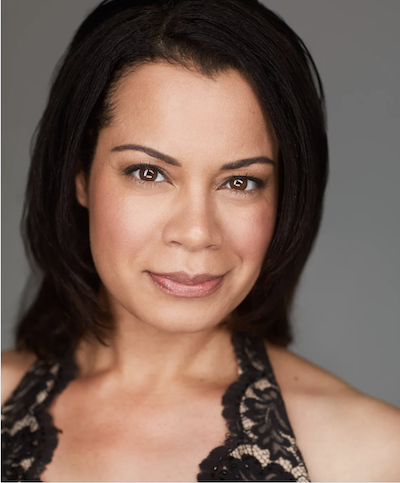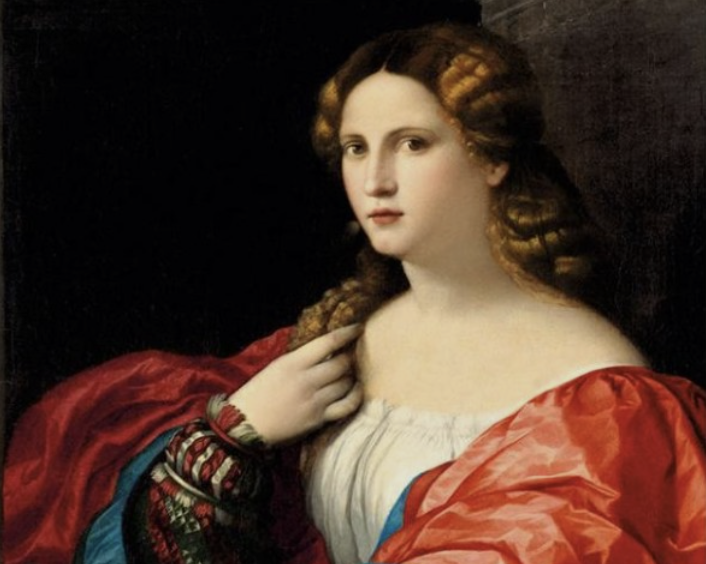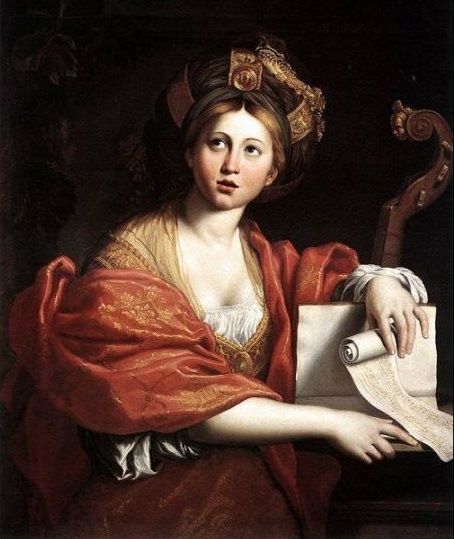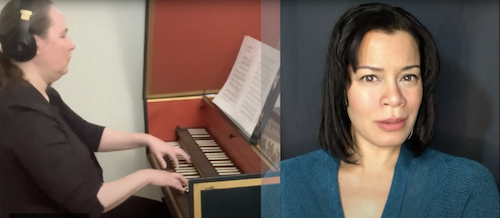by Jarrett Hoffman

Premiering online on Monday, March 15 at 7:30 pm, and remaining available for another 48 hours, “Women in Music” will feature instrumental and vocal works from the 17th-19th centuries by Francesca Caccini, Barbara Strozzi, Isabella Leonarda, Élisabeth Jacquet de la Guerre, Maddalena Sirmen, and Clara Schumann. See the full program and register here. It’s free to watch, but a donation is suggested.
Les Délices artistic director Debra Nagy, who is also the host of SalonEra, will be joined by harpsichordist Byron Schenkman, violinist Shelby Yamin, and soprano Michele Kennedy (above), who share a commitment to researching, performing, and recording music by women composers.
I reached Kennedy by telephone in Oakland, California to talk about the selections by three 17th-century Italian composers: Caccini, Strozzi, and Leonarda. We also discussed the societal restrictions on women of that era, and in some cases, the connections that helped these composers establish their careers. And we closed our phone call on the topics of equity and representation in classical music — particularly, Kennedy’s efforts to further that work while sheltering at home.
We began our conversation with a historic piece: La liberazione di Ruggiero. Not only is it Caccini’s only surviving opera, but it’s also believed to be the first opera by a woman, and possibly the first Italian opera to be performed outside of Italy.
Kennedy will be singing “Chi nel fior di giovinezza,” a scene featuring the Siren. “She’s instrumental in luring Ruggiero into the world of the island, and into the powers that rule that island, which are all feminine,” the soprano said. “In a way, she’s a traditional siren because she is a seductress, but she is also clever. She doesn’t want Ruggiero to discover his independence from the lures of the island, as he later does. So her purpose is two-fold — both seductive and powerful, and she certainly commands this scene.”
Although the brief dialogue with Ruggiero will be cut in this virtual collaboration, there’s plenty of interest in the Siren’s solo sections. In particular, Kennedy pointed out the refrain segua Amor — “follow Love,” referring to the goddess of love. “The aria has a mesmerizing quality, but that refrain is very recognizable, and to me, it’s weighted toward the commanding,” she said.

That might raise a question of taste for a performer — does it make you feel boxed in, or is it nice to have that extra guidance from a master? “That’s a good question,” Kennedy said. “I love singing her cadenzas, and to me, they do feel like they have some rubato and flexibility, even though they’re so detailed.”
Strozzi will be represented by her standalone arietta Amore è bandito. It’s a witty song about banning love, but Kennedy hears more and more nuance in it the longer she lives with the text. “I think it’s a bit tongue-in-cheek,” the soprano said.
In part, she hears that in the tight turnarounds from refrain to verse and back again, which add a relentless and breathless quality to the music. “It makes you wonder what Strozzi wanted to say with that. Maybe that love is so dramatic — can’t it be banished already? — but that she’s still kind of enthralled with it.”
That relentlessness also makes for a nice vocal challenge. “It just keeps going,” Kennedy said. “The entire piece, there’s no respite. I think that reflects Strozzi’s mastery — what she demanded of herself as a vocalist, and of anyone who would sing her music.”
But in one way, this aria is a departure from other Strozzi settings that Kennedy has sung. “There’s usually a lot of pathos, heartache, and longing in her music,” the soprano said. “She’s a master of the appassionato and often the furious vantage point as well. That makes me wonder about her social position, and how much of her frustrations about it might be manifested in her music.”

It’s also interesting to note that Strozzi lived an unconventional life for that time period. “She had several children, but chose not to marry,” Kennedy said, adding that one famous portrait of Strozzi depicts her in a way that’s “a little bit baudy.” The takeaway from that portrait is up for debate. “Did Strozzi make a point to live her life as she wanted to, and strut all of her colors boldly? As she certainly does with her music. And/or was that just one perception of a brilliant, independent-thinking woman of the time?”
In terms of privilege, Caccini similarly came from a family of artistic prominence — her father was a well-established musician and writer. That helped enable her rise at the Medici court as a composer, performer, teacher, and rehearsal coach. “But even within the ranks of that court, there were a lot of questions about the roles of women, and whether it was fitting for them to take a prominent seat at the table,” Kennedy said.
The soprano sees an interesting contrast between those two composers and Isabella Leonarda, whose “Cara Regina” — from her late collection of motets for voice and accompaniment, Op. 20 — completes Kennedy’s performing duties.
“She joined the Convent of Saint Ursula at age 16, ascended the ranks there, and eventually became mother superior and a regional counselor for the Ursuline,” Kennedy said. “She was a very visible and respected leader, and she was able to publish this fantastic range of repertoire — a phenomenal volume of work. So I do see her story as a portrait of a woman rising to power within the social constraints of the day.”
The text of the “Cara Regina,” a Marian motet, has also inspired Kennedy to consider the angle of the divine feminine. “I’ve thought a lot about what it means to center Mary in worship as a nurturing and maternal figure, but also as a very powerful one.”
~ ~ ~
Kennedy’s role in this Les Délices program represents one example of her commitment to shining a spotlight on underrepresented voices in classical music. She writes in her bio that she’s been aiming to further that work while sheltering at home.
First, as with many musicians adapting to the pandemic, that required her to delve into the world of technology in order to capture high-quality audio and video on her own. “I have learned a lot, but it’s been humbling, and it’s quadrupled my respect for recording engineers,” Kennedy said.
She’s also undergone an evolution of creative identity. “After the initial shock of the pandemic, when concert life as we’ve known it disappeared, I began to think about what’s possible that wasn’t possible before, and how I could take ownership over my artistic vision anew under these conditions.” The heightened level of freedom and agency that brought on was daunting to her at first. Then it became empowering. “I can do the work that means the most to me,” she said.
For her, that has meant thinking about programming in less conventional, more timely ways. “What voices do we really want to celebrate and better understand?” she said. “Certainly the world of 17th-century female composers is rich for the mining, as are so many other voices at play in current events.” That led us to the question that the whole concert world is reckoning over: “How do we pay tribute to the masterworks that we all know and love, and the wider range of voices that we really need to be honoring on the stage?” she said.
She admires how Les Délices has used the new format of its “digital salon” to respond to the moment, bringing together artists and scholars from distant places to grapple over music and history in a single evening. “That wasn’t possible before, not in the same way,” she said.
Wrapping things up, we landed on one surprising parallel between the present day and the lives of these 17th-century composers: a pandemic. Caccini, Strozzi, and Leonarda all lived through outbreaks of the bubonic plague in Italy, and Caccini was forced to quarantine for three years in Lucca before she could return to the Medici court in Florence.
“That’s a really long time,” Kennedy said, laughing. “Isn’t that something? It actually kind of inspires me. You know, we’ve all lost so much — not just the world of live performance, but so many beloved people, and American life as we knew it. There’s a lot of grief, and I think a lot of creative vision is born from suffering — it’s like our greatest catharsis. I actually think in some ways that creativity is flowering anew because of the depths of what we’ve gone through.”
Published on ClevelandClassical.com March 9, 2021.
Click here for a printable copy of this article




